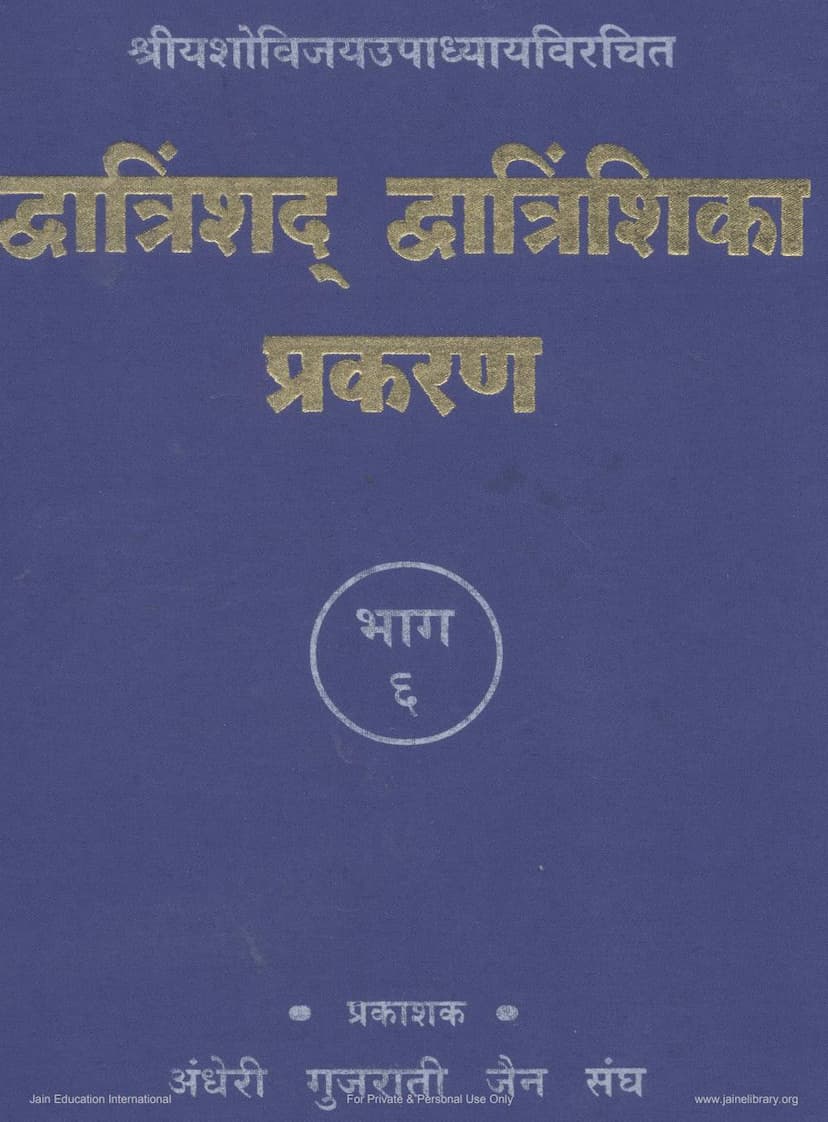Dwatrinshada Dwatrinshika Prakran Part 6
Added to library: September 1, 2025

Summary
Here's a comprehensive summary of the Jain text "Dwatrinshada Dwatrinshika Prakran Part 6" by Yashovijay Upadhyay and Yashovijay of Jayaghoshsuri, published by Andheri Jain Sangh:
Overall Context:
This book is Part 6 of a larger series, likely the "Dwatrinshada Dwatrinshika Prakran," authored by the prominent Jain scholar Yashovijay Upadhyay (also referred to as Yashovijay Gani). The series focuses on the "Dwatrinshat Dwatrinshika," a significant Jain text. Part 6, specifically, delves into the 23rd to 26th chapters (or "Bātrisī" in Gujarati/Hindi) of this work. The publication is by the Andheri Gujarati Jain Sangh, indicating a dedication to making this profound philosophical and spiritual content accessible through detailed commentary and translation. The text is praised for its insightful Sanskrit commentary and clear Gujarati explanations, aiming to elucidate complex spiritual concepts.
Key Themes and Content (Based on the provided pages):
The summary indicates that this volume, Part 6 of the Dwatrinshat Dwatrinshika Prakran, focuses on crucial aspects of Jain philosophy and spiritual practice, particularly related to yoga, spiritual progress, and the overcoming of obstacles. The author and commentators delve deeply into these themes using the profound language and intricate logic of Jainism.
Here's a breakdown of the likely content of the 23rd to 26th Bātrisīs:
-
23rd Bātrisī: Kutarkagraha Nivṛtti Dvātriṁśikā (On the Cessation of Fallacious Reasoning): This section likely addresses the dangers of kutarka (fallacious reasoning) and how it impedes spiritual progress. It probably expounds on the importance of correct reasoning and adhering to scriptural authority (āgama). The text likely uses allegorical stories and logical arguments to illustrate how erroneous logic arises from avidyā (ignorance) and how it leads to negative consequences, emphasizing the need to abandon such faulty reasoning and embrace the right path based on shraddhā (faith), śīla (virtuous conduct), and yoga (spiritual discipline). The commentary highlights how kutarka can be a significant obstacle to mokṣa (liberation).
-
24th Bātrisī: Sadr̥ṣṭi Dvātriṁśikā (On Right Perspectives/Views): This section likely discusses the different spiritual dr̥ṣṭis (perspectives or stages of spiritual understanding) described in Jainism. It probably elaborates on the concept of yoga and its various limbs or stages, possibly referencing the eightfold path of yoga mentioned in other traditions but interpreted through a Jain lens. The commentary highlights the advancement through these stages, moving from initial insights to deeper spiritual absorption. It also likely discusses the importance of samādhi and the attainment of inner peace and spiritual liberation through disciplined practice. The commentary emphasizes the synthesis of knowledge (jñāna) and practice (kriyā) as essential for spiritual growth.
-
25th Bātrisī: Kleśahāna Upāya Dvātriṁśikā (On the Means of Overcoming Afflictions/Passions): This section focuses on the core Jain concept of overcoming kleśas (passions, afflictions, or impurities) such as ignorance (avidyā), egoism (asmitā), attachment (rāga), aversion (dveṣa), and the clinging to existence (abhiniveśa). It likely contrasts Jain philosophy with other schools of thought (like Buddhism and Yoga) regarding the means of achieving liberation from these kleśas, emphasizing the Jain emphasis on the combined power of right knowledge (samyak jñāna) and right conduct (samyak cāritra). The text critically examines the validity of other doctrines while upholding the comprehensive approach of Jainism.
-
26th Bātrisī: Yogamāhātmya Dvātriṁśikā (On the Greatness of Yoga): This section is dedicated to extolling the virtues and power of yoga as described in Jainism. It likely elaborates on the various siddhis (supernatural powers) that can be attained through yogic practices, as well as the ultimate goal of mokṣa. It might also analyze and compare yogic concepts from other traditions, suchs as Patanjali's Yoga Sutras, highlighting their integration or divergence with Jain principles. The text likely explains the yogic methods for achieving concentration, purification of the mind, and ultimately, liberation.
Commentary and Scholarship:
The text is noted for its extensive Sanskrit commentary, particularly the "Nayelaṭīkā" (a commentary by Muni Yashovijay, a disciple of Vishwalyanvijayji) and "Dvatrinshika Prakash Vyākhyā" (commentary on the Dvatrinshika by the publisher's lineage). These commentaries are praised for their clarity, depth, and ability to make the profound subject matter accessible through Gujarati explanations. The meticulous work of identifying and correcting errors in older editions using handwritten manuscripts is also highlighted, underscoring the scholarly effort behind this publication. The work also cites numerous other philosophical and religious texts, demonstrating a comprehensive understanding and synthesis of various traditions.
Key Highlights:
- Authoritative Authorship: The work is attributed to the esteemed Mahāmahopādhyāya Yashovijay Upadhyay, a renowned scholar and victor in philosophical debates.
- Comprehensive Commentary: The accompanying Sanskrit and Gujarati commentaries are highly valued for their clarity and accessibility.
- Focus on Yoga and Spirituality: The volume specifically targets the yogic and spiritual path within Jainism, detailing practices and philosophical underpinnings.
- Scholarly Rigor: The publication emphasizes accuracy through manuscript comparison and correction.
- Inter-Disciplinary Synthesis: The commentary draws upon and synthesizes concepts from various philosophical and religious texts, showcasing a broad intellectual scope.
Publisher and Intent:
The Andheri Gujarati Jain Sangh, through this publication, aims to contribute to the preservation and dissemination of important Jain literature. The fact that it's published from the Sangh's "Gyan Khata" (knowledge fund) indicates a philanthropic motive to spread knowledge.
In essence, this book is a scholarly and devotional effort to present the deep spiritual insights of the Dwatrinshat Dwatrinshika, focusing on the practical and philosophical aspects of yoga and the path to liberation, making it accessible to a wider audience through insightful Gujarati explanations.